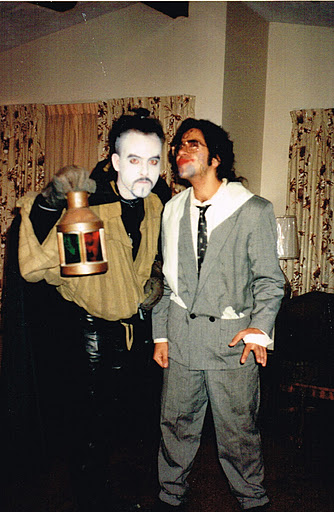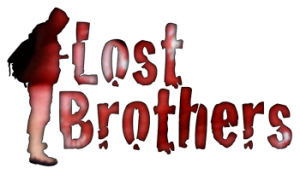A collection of posts that form the back story of this blog.
Mood music:
[spotify:track:19n9s9SfnLtwPEODqk8KCT]
The Long History of OCD
An OCD Christmas. The first entry, where I give an overview of how I got to crazy and found my way to sane.
The Bad Pill Kept Me from the Good Pill. How the drug Prednisone brought me to the brink, and how Prozac was part of my salvation.
The Crazy-Ass Guy in the Newsroom. Think you have troubles at work? You should see what people who worked with me went through.
The Freak and the Redhead: A Love Story. About the wife who saved my life in many ways.
Snowpocalypse and the Fear of Loss. The author remembers a time when fear of loss would cripple his mental capacities, and explains how he got over it — mostly.
The Ego OCD Built. The author admits to having an ego that sometimes swells beyond acceptable levels and that OCD is fuel for the fire. Go ahead. Laugh at him.
Fear Factor. The author describes years of living in a cell built by fear, how he broke free and why there’s no turning back.
Prozac Winter. The author discovers that winter makes his depression worse and that there’s a purely scientific explanation — and solution.
Have Fun with Your Therapist. Mental-illness sufferers often avoid therapists because the stigma around these “shrinks” is as thick as that of the disease. The author is here to explain why you shouldn’t fear them.
The Engine. To really understand how mental illness happens, let’s compare the brain to a machine.
Rest Redefined. The author finds that he gets the most relaxation from the things he once feared the most.
Outing Myself. The author on why he chose to “out” himself despite what other people might think.
Why Being a People Pleaser is Dumb. The author used to try very hard to please everybody and was hurt badly in the process. Here’s how he broke free and kept his soul intact.
The Addiction and the Damage Done
The Most Uncool Addiction. In this installment, the author opens up about the binge-eating disorder he tried to hide for years — and how he managed to bring it under control.
Edge of a Relapse. The author comes dangerously close to a relapse, but lives to fight another day.
The 12 Steps of Christmas. The author reviews the 12 Steps of Recovery and takes a personal inventory.
How to Play Your Addictions Like a Piano. The author admits that when an obsessive-compulsive person puts down the addiction that’s most self-destructive, a few smaller addictions rise up to fill the void. But what happens when the money runs out?
Regulating Addictive Food: A Lesson in Futility. As an obsessive-compulsive binge eater, the author feels it’s only proper that he weigh in on the notion that regulating junk food might help. Here’s why the answer is probably not.
The Liar’s Disease. The author reveals an uncomfortable truth about addicts like himself: We tend to have trouble telling the truth.
Portable Recovery. Though addiction will follow the junkie anywhere in the world, the author has discovered that recovery is just as portable.
Revere (Experiences with Addiction, Depression and Loss During The Younger Years)
Bridge Rats and Schoolyard Bullies. The author reviews the imperfections of childhood relationships in search of all his OCD triggers. Along the way, old bullies become friends and he realizes he was pretty damn stupid back then.
Lost Brothers. How the death of an older brother shaped the Hell that arrived later.
Marley and Me. The author describes the second older brother whose death hit harder than that of the first.
The Third Brother. Remembering Peter Sugarman, another adopted brother who died too early — but not before teaching the author some important lessons about life.
Lessons from Dad. The author has learned some surprising lessons from Dad on how to control one’s mental demons.
The Basement. A photo from the old days in Revere spark some vivid flashbacks.
Addicted to Feeling Good. To kick off Lent, the author reflects on some of his dumber quests to feel good.
The lasting Impact of Crohn’s Disease. The author has lived most of his life with Crohn’s Disease and has developed a few quirks as a result.
The Tire and the Footlocker. The author opens up an old footlocker under the stairs and finds himself back in that old Revere basement.
Child of Metal
How Metal Saved Me. Why Heavy Metal music became a critical OCD coping tool.
Insanity to Recovery in 8 Songs or Less. The author shares some videos that together make a bitchin’ soundtrack for those who wrestle with mental illness and addiction. The first four cover the darkness. The next four cover the light.
Rockit Records Revisited. The author has mentioned Metal music as one of his most important coping tools for OCD and related disorders. Here’s a look at the year he got one of the best therapy sessions ever, simply by working in a cramped little record store.
Metal to Stick in Your Mental Microwave.
Man of God
The Better Angels of My Nature. Why I let Christ in my life.
The Rat in the Church Pew. The author has written much about his Faith as a key to overcoming mental illness. But as this post illustrates, he still has a long way to go in his spiritual development.
Absolute Power Corrupts Absolutely. The author goes to Church and comes away with a strange feeling.
Running from Sin, Running With Scissors. The author writes an open letter to the RCIA Class of 2010 about Faith as a journey, not a destination. He warns that addiction, rage and other bad behavior won’t disappear the second water is dropped over their heads.
Forgiveness is a Bitch. Seeking and giving forgiveness is essential for someone in recovery. But it’s often seen as a green light for more abuse.
Pain in the Lent. The author gives a progress report on the Lenten sacrifices. It aint pretty.



